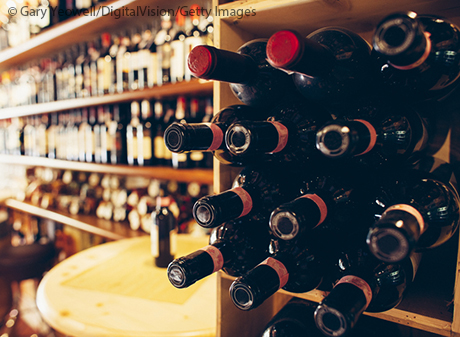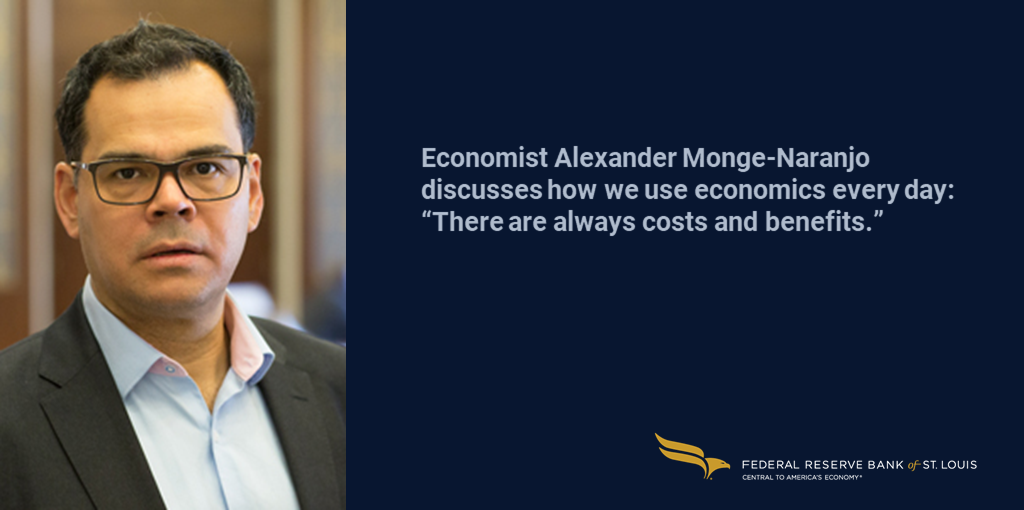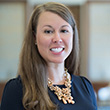What an Economist Considers When Buying a Bottle of Wine

If you bring a bottle of wine to a party as the gift for the host, what are the economics of purchasing and giving that gift? What are the costs and benefits? In an interview, Alex Monge-Naranjo, an economist and Research officer at the Federal Reserve Bank of St. Louis, discussed how people use economics in decisions like choosing wine, and shared his thoughts about being and becoming an economist.
Maria Hasenstab: Alex, what common daily life dilemma do you think can be solved using economics?
Alex Monge-Naranjo: Well, consciously or unconsciously, we’re always using economics, indeed when we face every single problem in our lives, because there are always costs and benefits. Should I take the train? Or should I spend more money and take an Uber or take a taxi? Should I buy a fancy bottle of wine when I go to a party, or should I go cheaper on that? There are always costs and benefits.

Essentially, economics is a discipline in which many problems are formalized, and there is mathematics, there is logic, there is data. And then we study how people seemingly solve their day-to-day problems.
We may not know it, but that’s what we are doing all the time.
Maria: Well, I think that was a great example you mentioned, buying a bottle of wine, going to a party. Say I stop at the store to buy a bottle of wine. What are those things that I’m considering?
Alex: First of all, how much money is in my pocket? If I spend more on this, will this affect how much money I will be able to pay for lunch the day after? Or whether I can go back home and buy another bottle of wine for the next day? Those will be the costs.
What about the benefits? Well, if you present a friend that you really like with a bottle of wine, then you’re going to make this person happier or, more egotistically, you’re going to give a nicer impression. So, it could be also something for you to give a nice present as opposed to a cheap present.
Economic Crisis in Costa Rica Prompted an Interest in Economics
Maria: Why did you become an economist?
Alex: You know, I was growing up in Costa Rica, which for Latin American standards is a fairly stable country. But in the early 1980s, when I was about to become 11, 12 years old, the only major economic crisis in the recent history of the country took place. And all the issues that were being discussed in the media and that everyone was concerned about were economic problems—unemployment, devaluations, high inflation, etc.
Because the prices were going up, the interest rate was going up. People who had the [bank] deposits, they were seeing that they were not worth that much because prices were much higher. On the other hand, some people were quite happy. Because imagine that you owe 100,000 pesos, but then suddenly the prices of all goods triple within two years. Then, in real terms [that is, after adjusting for inflation], you are on the hook for only one-third of what you originally thought you had to pay.
So those issues were being discussed every day, with a lot of intensity. At those ages, I was thinking, should I be a doctor, should I be a lawyer, should I be a mathematician or an archeologist or geologist? Those were the big questions I was having in my mind. And I started seeing that, oh, there are a lot of cool, interesting problems. And there were some good economists discussing issues. And I thought that they were super smart, that they seemed to be more interesting [to me] than people in other disciplines.
Is an Economics Doctorate a Good Investment?
Maria: You have a Ph.D. in economics from the University of Chicago. In your opinion, is getting a Ph.D. worth it?
Alex: Yes. I mean, in my case, certainly. I can only speak for myself. But I can say that it was transformational and one of the wisest decisions I made. It’s a very challenging experience. It could be traumatic for some. And certainly I think it changes the person that you are.
Now, whether it is worth getting [a Ph.D.]: I think it’s person specific. I mean, if economics is not really your forte or you’re not really interested in it, you should not do it. But if you like it, then I think if your skillset also can handle it, then certainly it’s an amazing experience. So I think it’s something that people have to think about very seriously if they want to get into it.
Maria: Along those lines, what advice would you give to someone in high school or college who is considering studying economics?
Alex: Well, prepare yourself. There is a set of skills and basic knowledge that are super important in economics and many other fields. I think a good solid background in mathematics is almost essential. And when I say a good solid background in mathematics, it’s not that you should become a mathematician. No. But the standard undergraduate preparation for an engineer may be enough, if it’s sufficiently formal.
If someone wants to go from high school [to studying economics in college] or is thinking about going to graduate school, I say take the more challenging honors calculus and algebra and learn some computational stuff. Because nowadays we use models that we cannot solve by pencil and paper. The computer is becoming a more important tool.
That’s in terms of preparation. The same as if you want to do any sports, you want to do preparation to be physically fit. In this case, it’s also that you have to be mentally fit.
But also try to get a good handle. Talk to people who have studied economics—and not one person. Because experiences can vary across people. Get a sense of what is it that you will be doing, what economics is good for, what are the limits.
And try to read some of the basic books. That’s one of the things that people who have done a Ph.D. in economics could help you with. Go and read a couple of books about different people working in economics to see whether this is something you want to spend the rest of your life reading and writing about.
Maria: Well, that’s sound advice.
How Paying for College Is Different in Costa Rica
Maria: I wanted to ask you about living in another country, and cultural differences handling money. For example, how did you pay for college?
Alex: That was quite different. The government covers a lot of expenses when you go to college there. Financing college is a different proposition in Costa Rica, at least in my time, than what it is now in the U.S.
I was living with my parents, and that was the typical thing to do. In Latin America, I think still to this day, most people stay with their parents while they go to college. And it’s only after you graduate and a few years later that you move out.
And also, college was way less expensive. My parents were paying for it. But essentially, we’re talking about $4,000 a year, which covered tuition and pretty much all the materials. I think that’s pretty much what it boils down to.
After one year and a half, one of the professors called me to be her TA (teaching assistant). And because of that, I didn’t get much money, but essentially, I got the tuition paid for.
Maria: That’s great.
Alex: Yeah. Whereas now I have two children. In my case, I have to think about where the money is going to come from when they go to college. And the answer is from me, one way or another.
Maria: That means…
Alex: It means that if you invite me for dinner, I may end up not bringing a super expensive bottle of wine…
More to Explore
- Timely Topics podcast: The Role of Human Capital in Production
- Open Vault blog: Why I Chose to Study Economics: A Student Shares Her Story
- Open Vault blog: Three Ways to Think Like an Economist, Starting Today
This blog explains everyday economics and the Fed, while also spotlighting St. Louis Fed people and programs. Views expressed are not necessarily those of the St. Louis Fed or Federal Reserve System.
Email Us


